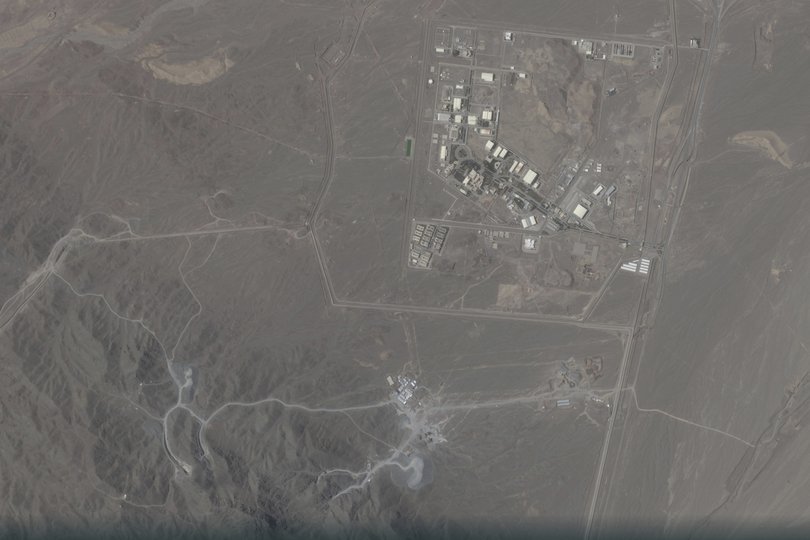Iran not complying with nuclear obligations, UN watchdog says
The UN’s nuclear watchdog has declared Iran in breach of its nonproliferation obligations for the first time in 20 years.

The United Nations’ nuclear watchdog Thursday declared Iran in breach of its nonproliferation obligations for the first time in 20 years, according to a copy of the resolution adopted by the agency’s board of governors and seen by The Washington Post.
The resolution, from the International Atomic Energy Agency (IAEA), cited “undeclared nuclear material and activities” discovered by agency inspectors at three sites a number of years ago that Iran has never explained.
“Iran has repeatedly either not answered” IAEA requests “or not provided technically credible answers,” IAEA Director General Rafael Grossi told the 35-nation board on Monday. Additionally, he said, Iran has sought to “sanitise the locations,” which the agency has now concluded were part of a “structured” nuclear program in the early 2000s.
Sign up to The Nightly's newsletters.
Get the first look at the digital newspaper, curated daily stories and breaking headlines delivered to your inbox.
By continuing you agree to our Terms and Privacy Policy.“Unless and until Iran assists the agency in resolving the outstanding safeguards issues, the agency will not be in a position to provide assurance that Iran’s nuclear program is exclusively peaceful,” Grossi said.
Iranian refusal to say what happened to the nuclear material at the sites has been a long-standing issue among IAEA member states, particularly in Europe. The Thursday resolution concluded that the agency had been prevented from being able “to verify that there has been no diversion of nuclear material required to be safeguarded.”
In a report prepared last month for the board meeting, the IAEA also reported that Iran had continued its high-level uranium enrichment it had begun following President Donald Trump’s first-term withdrawal from a nuclear agreement signed by the Obama administration and had increased its stockpile of near-weapons-grade material by at least 50 percent since February.
Tehran immediately condemned the Thursday resolution, calling it politically motivated and “orchestrated by the United States.” In a joint statement, the Iranian Foreign Ministry and the Atomic Energy Organization of Iran announced plans to open a new uranium enrichment site and upgrade the first-generation centrifuges it uses at its Fordow facility.
“The Islamic Republic of Iran has no choice but to respond to this political resolution,” the statement said, according to a readout from Iranian state media. It said the new enrichment site would be in a “secure location,” without giving further specifics.

The diplomatic confrontation came as tensions soared in the Middle East, amid growing fears Israel is planning an imminent strike on Iran. The United States on Wednesday said it was drawing down military and diplomatic personnel across the Middle East in anticipation of such a strike, even as a sixth round of U.S.-Iran nuclear talks were scheduled for Sunday in Oman.
Such a move by Israel would almost certainly scuttle the nuclear negotiations. Still, Trump’s Middle East envoy, Steve Witkoff, will travel to Muscat on Sunday for talks with Iranian Foreign Minister Abbas Araghchi, according to a person familiar with the plans who spoke on the condition of anonymity to discuss the sensitive diplomacy.
Trump said Thursday that as long as he thinks there’s a chance for an agreement for Iran not to have a nuclear weapon, he did not want Israel “going in because I think that would blow it. Might help it actually, but it also could blow it.”
The talks appeared to have hit an impasse. Iran’s supreme leader criticized last week the proposal that U.S. negotiators had presented to their Iranian counterparts, calling the U.S. position “nonsense.”
The central point of disagreement appears to be Iran’s right to enrich uranium domestically. Iranian officials have said the right to enrichment is a red line for Tehran. The Trump administration’s position is less clear: At times, U.S. officials have insisted on zero enrichment and in other instances, they’ve expressed support for strict limits.
During his first term as president, Trump withdrew from the 2015 nuclear deal Iran struck with world powers, including the United States. That agreement curbed Iran’s atomic energy activities, in part through stringent inspections, in exchange for widespread sanctions relief.
It was unclear Thursday if the new facility Iran announced will increase Tehran’s nuclear proliferation threat, said Kelsey Davenport, the director for nonproliferation policy at the Arms Control Association, a Washington-based group that advocates for limits on nuclear weapons.
Regardless, the move is “concerning,” Davenport said. “If this turns out to be a facility that Iran has already built out, then it could become operational relatively quickly and pose much more of a risk,” she said, describing Iran’s overall response to the IAEA vote as “measured.”
But if Iran fails to cooperate with the IAEA, the issue will be raised at another meeting of the board of governors later in the summer. Iran could also be referred to the U.N. Security Council.
European nations in particular are faced with a fast-approaching deadline for a diplomatic resolution. The authority to reimpose a number of harsh sanctions that were lifted under the 2015 nuclear deal expires in October. Among the “snapback” sanctions are a U.N. arms embargo, a ban on uranium enrichment and a global asset freeze targeting certain Iranian individuals and entities.
In the resolution passed on Thursday, the IAEA referred directly to the talks between Iran and the United States. It called on all parties to support “a diplomatic solution to the problems posed by the Iranian nuclear program,” as well as “an agreement that addresses all international concerns related to Iran’s nuclear activities.”
- - -
Maegan Vazquez in Washington contributed to this report.
© 2025 , The Washington Post
